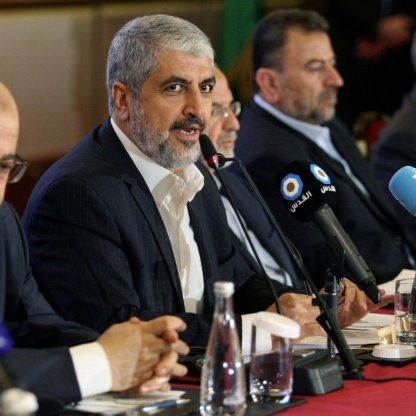
News

If there were elections in the Palestinian territories
PAULA SLIER
These Palestinian groups have been at loggerheads for more than a decade, ever since Hamas won parliamentary elections in Gaza and a brutal civil war ensued that saw fierce fighting between the sides.
I was in Gaza at the time and one of the most telling memories I have is of a schoolteacher who supported Fatah but refused to admit it on camera for fear he would lose his job. Now, 11 years on, he’s probably more anti Hamas than ever; as are many in Gaza, although they too are unlikely to say it in public.
Being in government hasn’t proven hugely fruitful for Hamas. The movement has – or at least it used to have before trying its hand at governing – widespread grassroots support across Gaza through its extensive network of food banks, schools and medical clinics.
But a decade of being in power, has left it fatigued and unpopular; those Gaza residents I talk to complain that Hamas leaders are corrupt – even more corrupt than Fatah who ruled before them, they are quick to stress – and that they’ve imposed astronomically high taxes on the population. There’ve also been three wars with Israel during the time they’ve been in power.
Meanwhile, across in the West Bank where Palestinian president and Fatah leader Mahmoud Abbas governs, he isn’t faring much better. An increasingly unpopular figure, polls have consistently shown that most Palestinians want him to resign. Residents of the West Bank would much rather have a Hamas government over what they see as an ineffective and impotent Fatah president, but this is largely because they haven’t had first-hand experience of living under the militant group’s leadership and so for them Hamas still has a “clean” reputation.
Backtrack to 2007 when fighting between the factions was at its severest and I remember interviewing Hamas supporters in the West Bank city of Ramallah “under cover” – they were afraid to openly say they supported the group. Today these same men, no doubt, are standing tall.
Last week the sides agreed to a framework for reconciliation and without going into its details here, suffice is it to say that the agreement offers nothing new aside from Hamas and Fatah agreeing that they need to reconcile. The sticky issues remain sticky: what to do with Hamas’ military wing which insists on operating independently of this new unity government, and the roughly 50 000 Hamas officials who in the last 10 years have been employed in its Gaza ministries?
There are tens of thousands of Fatah employees who for the past decade have been waiting to get their jobs back and it’ll prove difficult to keep everyone employed.
Jerusalem isn’t exactly doing cartwheels over the “marriage between partners who have long since grown to dislike each other”, as one Gaza resident put it to me. The deal allows Hamas, as its newly-elected prime minister Yahya Sinwar has said on various occasions, to now focus on its raison d’être – resistance against Israel – and not be bogged down in the day-to-day running of the Gaza Strip.
Israel, the United States and the European Union, regard Hamas as a terrorist organisation and Israeli Prime Minister Benjamin Netanyahu insists Jerusalem will only hold talks with a reconciled Palestinian government if Hamas disbands its armed wing, recognises the Jewish State and severs all ties with Iran.
But on the flipside, not all Western governments, Moscow among them, regard Hamas as such. Russian leadership has held direct talks with their Hamas counterparts and President Vladimir Putin is pushing hard for the reconciliation agreement to work.
Netanyahu might find himself backed into a corner, knowing he cannot be seen to oppose what the Russians want, as he needs them more than they need him. When it comes to Syria, Russian planes control the skies and if Israel is to continue – as she did again this week – carrying out strikes there, she needs Russian acquiescence.
As for President Abbas, what does he really have to lose? He’s presumably banking on the fact that once there’s a unified Palestinian front, Netanyahu can no longer use the excuse that there is no Palestinian partner with whom to talk peace. It seems fair to say that Abbas realises chances of negotiations with Israel at the moment are slim; he might as well focus on internal Palestinian unity.
But amid all the analysis of what the reconciliation deal means and its chances of success, there has been one consideration conspicuously absent in recent coverage.
Around two years ago, an offshore natural gas field was discovered near the Egyptian border on the Gaza side — it would be hugely profitable to the Palestinians, the Egyptians (who have been mediating the reconciliation deal and are also pushing hard for it to succeed) and even the Israelis.
Is it not conceivable that this renewed effort towards a unified Palestinian government – especially after so many previous failed attempts – is couched in Egyptian pounds and Israeli shekels?
This gas field is one of the largest in the Mediterranean and will be able to provide Palestinians in Gaza and the West Bank with electricity, income and jobs, for years to come. After all is said and done, perhaps this reconciliation deal will work for no other reason than that everyone gets to gain – economically more than politically – from it.
Paula Slier is the Middle East Bureau Chief of RT, the founder and CEO of NewshoundMedia and the inaugural winner of the Europcar Woman in Leadership Award of the South African Absa Jewish Achievers.




